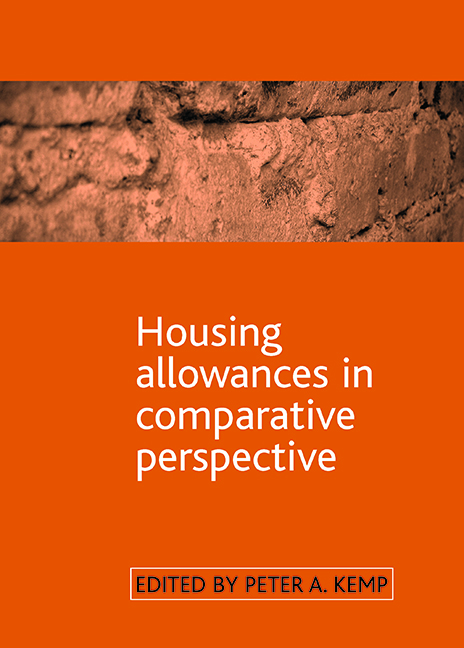Book contents
- Frontmatter
- Contents
- List of tables and figures
- Acknowledgements
- Notes on contributors
- one Housing allowances in context
- two Housing allowances and the restructuring of the Australian welfare state
- three The New Zealand experience of housing allowances
- four Canadian housing allowances
- five Housing allowances American style: the Housing Choice Voucher programme
- six Housing Benefit in Britain: a troubled history and uncertain future
- seven Housing allowances in France
- eight Housing allowances in Germany
- nine Housing allowances in the Netherlands: the struggle for budgetary controllability
- ten Housing allowance systems in Sweden
- eleven Housing allowances in the Czech Republic in comparative perspective
- twelve Housing allowances in the advanced welfare states
- Index
twelve - Housing allowances in the advanced welfare states
Published online by Cambridge University Press: 15 September 2022
- Frontmatter
- Contents
- List of tables and figures
- Acknowledgements
- Notes on contributors
- one Housing allowances in context
- two Housing allowances and the restructuring of the Australian welfare state
- three The New Zealand experience of housing allowances
- four Canadian housing allowances
- five Housing allowances American style: the Housing Choice Voucher programme
- six Housing Benefit in Britain: a troubled history and uncertain future
- seven Housing allowances in France
- eight Housing allowances in Germany
- nine Housing allowances in the Netherlands: the struggle for budgetary controllability
- ten Housing allowance systems in Sweden
- eleven Housing allowances in the Czech Republic in comparative perspective
- twelve Housing allowances in the advanced welfare states
- Index
Summary
Introduction
This book has examined the context, role, design and impacts of income-related housing allowances in a variety of countries. Chapters Two to Ten looked at nine advanced welfare states, while Chapter Eleven explored the experience of the Czech Republic and made comparisons with several other transition economies. This final chapter draws upon the preceding chapters to reflect upon the role of housing allowances in the advanced welfare states. The first section describes the broad welfare regime and housing market context of the ten main countries covered in the book. The second section compares important features of income-related assistance with housing expenditures across these countries. The third section examines key reform pressures and debates about housing allowances and the fourth section focuses on ‘housing vouchers’ as a possible future for income-related assistance with housing expenditures. The final section presents some conclusions.
Contextualising housing allowances
Although housing allowances have become an important policy instrument in many of the advanced welfare states, they are embedded within different national contexts. Table 12.1 summarises some key features of the social protection systems in each country covered by this book. Nine of the 10 countries were included in Esping-Andersen's typology of welfare regimes (the exception being the Czech Republic). Australia, New Zealand, Canada, the US and Great Britain were described by him as liberal welfare regimes, characterised by a low level of benefits, reliance on means testing and a relative emphasis on private social provision. France and Germany were classified as conservative welfare states, characterised by heavy reliance on status-maintaining social insurance schemes with relatively generous, earnings-related benefit levels and an emphasis on the ‘male breadwinner family model’. Meanwhile, Sweden and (more controversially) the Netherlands were described as social democratic welfare states, with a commitment to generous and universal benefits, high quality services and an emphasis on the dual-earner family (Esping-Andersen, 1990). While this typology has been subject to criticism, it nonetheless provides a useful summary description of institutional arrangements in respect of income protection in the advanced welfare states.
Broadly in line with this typology, with the exception of Canada, social insurance benefit generosity is lower in the liberal welfare states than in the conservative and especially the social democratic welfare states included in this book (Table 12.1).
- Type
- Chapter
- Information
- Housing Allowances in Comparative Perspective , pp. 265 - 288Publisher: Bristol University PressPrint publication year: 2007



